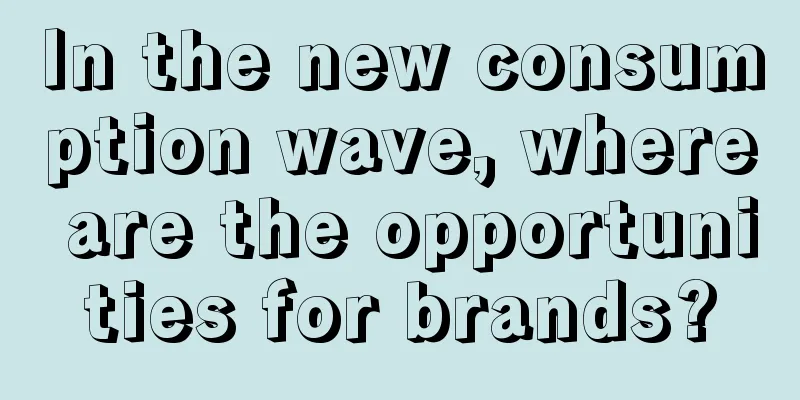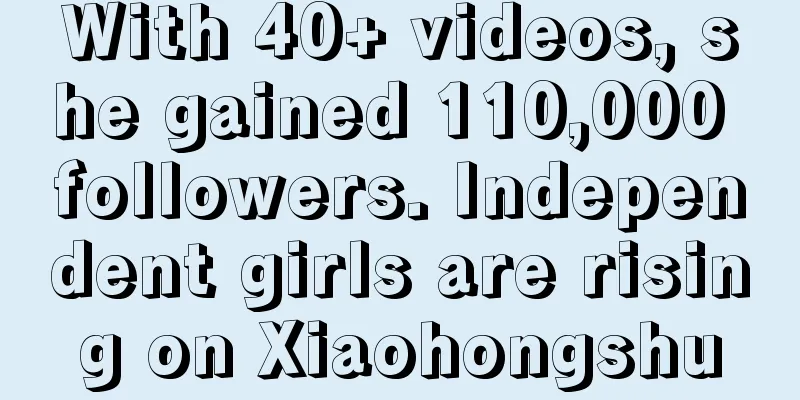The trend of celebrities selling goods has receded, and the live streaming market is gradually maturing

Double 11 has been a week past. Have you bought anything? Have you received the things you bought? I bought a lot of skin care products in the live broadcast room and have received them one after another. Now it seems that some products are indeed very cheap, but there are still many merchants who take advantage of the big promotion to temporarily increase the price. I had my eye on a pair of shoes and planned to buy them on the big sale day, but the price went up by more than 100 yuan on the day, so I didn't buy them. However, compared to these, the two most discussed topics this year were "cheap" and "anchors". Needless to say, cheapness has become an indispensable factor in shopping decisions; as for the anchors, celebrity artists with their own halo have attracted much attention. Take Yaowang Technology as an example: According to public data, the platform has more than 100 influencers, with 68,000 products on the shelves, a total of 2,200 live broadcasts, and a total broadcast time of 6,282 hours. The company's Double 11 GMV (total transaction volume) exceeded 3.29 billion yuan, and its artist Jia Nailiang personally generated sales of 1.36 billion yuan. This achievement not only led to the company's performance, but also made it the number one in the overall sales list on a certain short video platform. On the Xiaohongshu platform, Dong Jie, Zhang Xiaohui and Yi Nengjing also achieved good results. What comes with a surge is bound to be followed by a retreat. It is undeniable that this year's Double 11 also witnessed many celebrities slowly fading out of the live broadcast room, so what exactly is the business of celebrity live streaming? 1. From the perspective of opportunism and long-termismWhy? The earliest use of celebrities to promote products can be traced back to 2016. At that time, Alibaba's Taobao Live began to try to cooperate with some celebrities. That year, Zhang Dayi made her debut, with more than 410,000 viewers and a GMV of 20 million, breaking the Taobao Live record. This marks the beginning of the development of live streaming e-commerce. In 2017, many celebrities and internet celebrities achieved good results through live streaming. They really became popular in 2019. This year was considered an explosion of new online species, with the diversified development of social e-commerce, group buying, and live streaming e-commerce. By the end of the year, with the outbreak of the black swan event, everyone was unable to go out, and many celebrities also faced the dilemma of being unable to work normally. They began to use their influence and fan value to start their "side job journey." Some people entered the market early and received support from major short video platforms, and tasted the sweetness early; according to incomplete statistics, in 2020, at least 500 artists launched their first live streaming sales show, and this year was also called the first year of live streaming sales. A few days ago, I was chatting with a milk brand owner who I had worked with before. He said that in order to work with celebrities, the marketing department would print out a list and contact the agencies one by one. At that time, there was no standard for commissions for celebrity collaborations. The range can range from tens of thousands, hundreds of thousands, to millions, and the gap is quite large. You cannot be sure how much sales these collaborations can bring, but it seems that in the past, finding celebrity endorsements also required additional costs. It is more cost-effective to use the endorsement fee as a slot fee, and celebrity endorsements are a two-way cooperation. They want to get closer to the brand and seek more cooperation in other aspects, and the brand also needs their endorsement, which seems to kill two birds with one stone. Many celebrities are not interested in selling goods, and do not want to focus on selling goods. An artist agent close to me told me that the commissions they received from selling goods were not very generous. On the contrary, a live broadcast attracts 20-40 products, and the pit fees of dozens of products are higher than the commission. Many celebrities go there to increase their fans and pit fees. In business negotiations, they will also make it clear that they do not guarantee quantity, but can help spread the word. During that period, many celebrities were looking at short-term opportunities. In other words, no one was able to go out to film, so in order not to waste time, there was nothing to lose by investing in it. However, there was a new shift in development momentum later. Many celebrities have achieved great success in live streaming sales because they have strong business capabilities, good team service, and they like it. In addition, with the support of the platform, they think this industry has more prospects than the entertainment industry. There are also some stars who have accumulated a large number of fans through live streaming, such as Liu Tao, Jing Tian, Lin Yilun, Huang Shengyi, Yang Zi, etc.; there are also some stars who, although they have not achieved the head effect, are unwilling to give up the base of millions of fans, so they choose to stay in the live streaming industry. Frankly speaking, with so many young and handsome guys, their return to the entertainment industry may not be better than it is now. Therefore, live streaming has become their long-term career choice. Competition in the live broadcast industry is always very fierce, and celebrities are no exception. This phenomenon has become particularly obvious in 2022. Many celebrities quickly reached their limits in the live broadcast field, especially when dealing with public opinion issues caused by after-sales service, counterfeit goods, etc. In addition, the competition among major platforms for talent had basically ended, and the special support for celebrities in the past also decreased. This led to a sharp decline in the live broadcast data of celebrities. Therefore, since 2022, many stars who had previously received strong support from the platform have found themselves increasingly struggling in the live broadcast industry once they lost their loyal fan base. In the end, they had to make the difficult decision to stop their live broadcast career, which can be regarded as a final maintenance of their "personality reputation." 2. Why was it so easy for celebrities to sell goods through live streaming in the past, but it is not as easy as it is for internet celebrities now?1. Most celebrities don’t want to invest the energyThere is a clear difference between celebrities and internet celebrities. Most celebrities are trained in professional schools, such as Beijing Film Academy and Shanghai Theatre Academy, and then enter the entertainment industry. Internet celebrities basically follow platforms such as Tik Tok and Kuaishou, and rely on singing, dancing, and comedy, or they were businessmen in the early stages and suddenly became popular with a short video. Although both rely on "works" to attract public attention, the nature of these works is different; celebrity works focus on art forms such as film and television dramas, music, etc., while Internet celebrities rely more on platforms. There is also a big difference between the two in terms of public opinion influence. Every move and private life of a celebrity may become the focus of public attention, while the personal life and dynamics of an internet celebrity generally do not receive much attention. It is more obvious when it comes to bringing goods. Many celebrities have their own main jobs, such as filming movies, participating in performances, etc. Live streaming and selling goods is more of a side job or an attempt at new things; for internet celebrities, live streaming and selling goods may be their main source of income. Most of the products on the market now are cheap, and celebrities may not use these products at all, especially those celebrities whose main businesses are developing well. Naturally, they are unwilling to invest too much energy in live streaming to sell goods. I watched Mr. Dong's live broadcast of Pinghu Down Jacket last night. He was live from 7pm to 2am, and he mentioned that he only slept for three hours the day before. This long live broadcast and high-intensity workload may be difficult for a star to do. In addition, when celebrities promote products, they sometimes face the risk of public opinion storms. In another WeChat account of my entertainment circle, I often see that celebrities need to bring a host or commentator to announce when they promote products live. Many times, celebrities look for hosts or product explainers in order to reduce the time spent introducing products during live broadcasts and reduce the risk of saying the wrong thing. Finally, there are many ways for celebrities to make money. The five most recognized ways are performance income, advertising endorsements, commercial activities, music releases, and merchandising. Pick any one of them, and none of them is more comfortable and easier than bringing goods. Therefore, many celebrities do not want to put a lot of energy into selling goods. After all, it is not their first choice of way to make money, so naturally they will not take it too seriously. 2. Users are becoming more professionalNowadays, when people watch live streaming, they not only watch the live broadcast, but also pay attention to how the anchor interacts with everyone and how deep his understanding of the product is. In this regard, Internet celebrities are much better than celebrities. Take my experience as an example: I like watching the live broadcast of a certain sports brand. In the live broadcast room, I often joke with the anchor, for example, asking him to help me try on that pair of shoes, or teasing that the face-slimming function is too strong, or asking him to turn down the volume of the central control. The anchor usually responds to me. If a celebrity does a live broadcast, it is likely that they will not be so approachable, because celebrities generally do not get close to the audience and interact directly with them like Internet celebrities and brands do. Moreover, as a consumer, I feel that influencers usually understand products better than celebrities. I have to put on makeup when hosting an event, and I used to use Bobbi Brown No. 16 liquid foundation, but I suddenly couldn’t find it a few days ago, so I planned to buy a cheaper substitute for emergency use, so I went to the live broadcast room of an internet celebrity. When I go to a celebrity's live broadcast room, he will introduce products to me and give me suggestions based on his personal experience. In comparison, although celebrities are famous, they may not know enough about these products and are unlikely to give specific suggestions. From a fan's perspective, I am also a star chaser. Although celebrities have a huge fan base, their fans like them more because of their movies, TV series, and music rather than the products they recommend. Moreover, you have no idea about the celebrities’ fashion taste, the products they use, and what they wear, or they are often out of reach for ordinary fans. Moreover, fans have different expectations of celebrities and internet celebrities. Celebrity fans pay more attention to private life, gossip, and artwork, while internet celebrity fans pursue lifestyle, aesthetics, or professional knowledge. Obviously, in some cases, product recommendations by influencers appear more authentic than those by celebrities. Through the detailed analysis of the above two points, it is not difficult to find that celebrities have large traffic and influence in bringing goods, but compared with the increasingly professional Internet celebrities, their gap in affinity, product knowledge and user interaction is visible to the naked eye. 3. Is the withdrawal of celebrities a good thing or a bad thing?I think it’s a “good thing” . Why? 1. The platform should build a stable community ecosystemRegardless of the type of community product platform, in the initial stage, it will rely on top KOLs and celebrities to attract traffic. However, as time goes by, the shortcomings of this strategy begin to emerge. For example: Just like the recent eyebrow pencil incident, a big anchor made a lot of people angry with just one casual remark; this shows that netizens nowadays are tired of celebrities and big anchors, and don’t want to see them stealing all the limelight anymore. At the beginning of live streaming, the distinctive top anchors and celebrities undoubtedly played a positive role in promoting the industry. However, over time, the traffic has been piled on these people, and other small and medium anchors and merchants have little chance. In order to resolve this imbalance, platforms and MCN agencies must change their strategies and lean more towards the majority of creators and merchants to promote the balance and healthy development of the ecosystem. This trend is also reflected in the graphic market. After about 10 years of development, we can see that the number of large self-media players with pictures and texts has decreased. Even for large accounts with millions of fans, the daily reading volume of each article can reach 50,000, which is a very good performance. What does this mean? Only by constantly reallocating traffic and resources and releasing more opportunities can everyone survive; the same is true for live streaming sales, which must be "de-centered" so that those small anchors and merchants with real talents will have the opportunity to stand out. 2. Give small and medium-sized anchors and businesses more opportunitiesNowadays, users are increasingly inclined to look for content and anchors that are more professional, more segmented, and more in line with their own values. Similarly, businesses are also more willing to find professionals in vertical industries to increase the premium and brand value of their products. Why? For example, when you plan to buy beauty, skin care, and health products for your parents or partner, you definitely don’t just look at the price. You also want to buy a better one. Similarly, merchants also want to deliver products with better cost-effectiveness to users. However, today's merchants do not want to be trapped in price wars. Therefore, the only way is to cooperate with creators and anchors who can increase premiums and provide high-quality content to brands. Therefore, those video bloggers and anchors who are familiar with their industry and have professional knowledge will have more advantages in the market. The current decline of celebrities happens to be a window of opportunity. 4. What specific inspiration can it give us?From the perspective of anchors, they need to establish themselves as KOP — Key Opinion Professional, that is, the role of key opinion professionals in the industry. This is different from the role of KOC — real consumers sharing their experience of using products. KOP is more focused on sharing professional content and delivering knowledge value. Simply put, each KOP is like a knowledge disseminator in his or her field, with the goal of revealing facts, helping the public understand the truth, and spreading valuable information. For brands, KOP’s analysis and sharing can help high-quality products and brands stand out, while exposing those brands that rely on marketing methods to mislead consumers. What kind of people are these KOPs? On the Zhihu platform, you can find many such examples, such as a PhD from the Institute of High-Level Physics of the Chinese Academy of Sciences, an expert with ten years of research experience in the field of dentistry, etc. They are more like craftsmen in various industries. Compared with KOLs, KOPs have a deeper understanding in their professional fields, and the knowledge they share is not only more authoritative but also more objective. Take my experience as an example: Recently I found that my face looked a bit yellow, and I heard that taking nicotinamide tablets can detoxify and whiten the skin. So I searched online and found a popular science article written by a doctor from Tsinghua University, from which I learned about the real effect of nicotinamide. The doctor also emphasized that niacinamide vitamin products that cost only a few dozen dollars on the market should not be trusted blindly. Many products are sold simply under the banner of niacinamide, but the actual effect is not obvious. It is important to focus on the combined effects of niacinamide and other ingredients, rather than a single ingredient. Therefore, if KOLs are mainly responsible for surface product promotion and KOCs share their personal experience of using a product, then KOPs go a step further, not only sharing professional knowledge but also deeply analyzing the ingredients and effects of the product to help consumers make more informed decisions. From the perspective of merchants, self-broadcasting and KOP co-creation are the core support for long-term development. Self-broadcasting means that merchants have strong control over content and can accurately convey their brand information, product features and marketing strategies, ensuring that these contents are consistent with their values and market positioning. This direct display method to consumers can not only reduce dependence on external media and advertising agencies, but also reduce marketing costs, communicate more directly with consumers, and establish stronger customer relationships. Some people say that self-broadcasting itself does not generate much traffic. In my opinion, people who can directly enter the merchant’s live broadcast room and stay for a long time must be accurate customers, and are more valuable than those celebrities who sell goods. Secondly, co-creation with KOP is an amplifier. As experts in their respective fields, KOP’s words are naturally profound, which can make the brand more popular and establish a good image. To put it bluntly, self-broadcasting by merchants, combined with long-term cooperation with KOP, constitutes a long-term growth strategy; this approach is also relatively healthy for short video platforms; it not only helps merchants grow, but also diversifies the content on the entire platform, improves the quality, and stays away from price involution. However, achieving all this is bound to be difficult. After all, nothing can be accomplished easily, and fighting to the end is a test of professional ability. V. ConclusionThe trend of celebrities endorsing products has receded and the market is gradually maturing. It not only marks the transition of the live streaming e-commerce era from simply "attention is king", but also means that consumers' pursuit of the quality of goods and services has begun to become the dominant force in the market. Author: Wang Zhiyuan WeChat public account: Wang Zhiyuan (ID: Z201440) |
>>: Another "grandma" celebrity has appeared. How many top "grandmas" are there in short videos?
Recommend
Can you monetize even if you have 0 fans? Check out the 6 monetization methods of Xiaohongshu bloggers
Whether you are a merchant or a blogger, you can&#...
What can be done before a cross-border e-commerce promotion?
When we run a store, we often feel that the popula...
Who is there at the Paris Olympics?
The 2024 Paris Olympics is not only a global sport...
How often are Shopee's preferred sellers updated?
Many Shopee merchants want to become preferred sel...
Taobao and JD.com do not pre-sell, and 618 enters "minimalist mode"
Taobao and JD.com cancelled the pre-sale mechanism...
What does Amazon's natural order mean? How to distinguish it from an advertising order?
Amazon is a cross-border e-commerce platform that ...
How to create an Amazon detail page? How to create pictures?
Now, there are indeed many friends who have made a...
How can the marketing customer acquisition team be data-driven?
How can the marketing customer acquisition team be...
What should I do if I am always injected with opinions?
On the Internet, everyone who speaks up seems to b...
What are the VAT application conditions for Amazon Middle East? Amazon VAT VAT rate
When opening a store on Amazon Middle East, you ne...
How to calculate Amazon gross profit? How to get 30% Amazon gross profit margin?
I believe everyone should know about Amazon. Amazo...
Can Douyin’s food delivery service take away Meituan’s business?
In 2022, Douyin tried food delivery and joined the...
The road to gold mining of silver age content
Explore the new roles and influence of the middle-...
Can the “9.9 yuan” in the coffee market last?
In this summer, many consumers have observed that ...
What is an Amazon independent promotional code? How to use an independent promotional code?
There are three types of discount codes on Amazon:...









